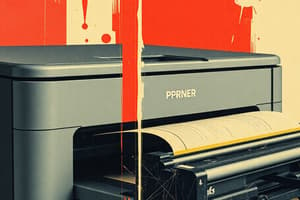Podcast
Questions and Answers
When a user tries to print a document on a laser printer, vertical lines appear on the printout. Which of the following should the technician replace?
When a user tries to print a document on a laser printer, vertical lines appear on the printout. Which of the following should the technician replace?
- Fuser
- Toner
- Mirror
- Drum (correct)
A customer wants to archive a large number of photos and does not plan to retrieve them often. What is the least expensive storage option per gigabyte?
A customer wants to archive a large number of photos and does not plan to retrieve them often. What is the least expensive storage option per gigabyte?
- NVMe SSD
- 5,400rpm HDD (correct)
- SCSI RAID
- 15,000rpm SAS
A user is printing a part with a thermoplastic polyurethane (TPU) filament on a 3-D printer. The first layer on every print job is not adhering properly. What should the user do to improve adherence on the first layer?
A user is printing a part with a thermoplastic polyurethane (TPU) filament on a 3-D printer. The first layer on every print job is not adhering properly. What should the user do to improve adherence on the first layer?
- Increase the print speed
- Raise the filament flow amount (correct)
- Lower the print bed temperature
- Adjust the RPM of the cooling fan
When a user tries to print a document on a laser printer, vertical lines appear on the printout. Which of the following should the technician replace?
When a user tries to print a document on a laser printer, vertical lines appear on the printout. Which of the following should the technician replace?
A customer wants to archive a large number of photos and does not plan to retrieve them often. Which of the following should the technician suggest for the least expensive storage option per gigabyte?
A customer wants to archive a large number of photos and does not plan to retrieve them often. Which of the following should the technician suggest for the least expensive storage option per gigabyte?
A user is printing a part with a thermoplastic polyurethane (TPU) filament on a 3-D printer. The first layer on every print job is not adhering properly. Which of the following should the user do to improve adherence on the first layer?
A user is printing a part with a thermoplastic polyurethane (TPU) filament on a 3-D printer. The first layer on every print job is not adhering properly. Which of the following should the user do to improve adherence on the first layer?
Study Notes
Laser Printer Maintenance
- Vertical lines on a laser printer printout indicate a damaged drum unit.
- The drum unit transfers toner to the paper based on an electrostatic image.
Storage Options
- Hard disk drives (HDDs) are the most cost-effective storage option per gigabyte.
- A 5,400rpm HDD is suitable for archiving large amounts of data that won't be accessed frequently.
- NVMe SSDs, SCSI RAIDs, and 15,000rpm SAS are more expensive options.
3-D Printer Troubleshooting
- The first layer of a 3-D print not adhering properly indicates an issue with filament flow.
- Increasing the filament flow amount (extrusion multiplier) can improve first-layer adhesion by ensuring enough filament is extruded.
- Lowering the print bed temperature can decrease adhesion and lead to warping or curling, especially with TPU filaments.
- Cooling fan adjustments are not a significant factor for first-layer adhesion, and may even cause damage to TPU prints.
- Increasing print speed can worsen adhesion issues with flexible filaments like TPU.
Laser Printers
- Vertical lines on a laser printer printout are usually caused by an issue with the drum unit
- The drum unit is responsible for transferring the electrostatic image to the paper
- Damage or defects on the drum surface cause uneven toner distribution, resulting in vertical lines on printouts
Storage Devices
- 5,400rpm HDD offers the lowest cost per gigabyte, making it ideal for archiving large amounts of data that are not accessed often
- NVMe SSD, SCSI RAID, and 15,000rpm SAS offer higher performance but come at a higher cost per gigabyte
3D Printing
- TPU filament requires adjusting the filament flow amount to ensure proper first layer adhesion on a 3D printer
- Increasing the flow amount ensures that enough filament is extruded to create a strong bond with the print bed
- Lowering the print bed temperature might decrease adhesion
- Adjusting the cooling fan RPM usually has minimal impact on first layer adhesion
- Increasing print speed might worsen the first layer adhesion
Studying That Suits You
Use AI to generate personalized quizzes and flashcards to suit your learning preferences.
Related Documents
Description
This quiz covers essential maintenance and troubleshooting tips for laser printers, storage options, and 3-D printing issues. Learn about drum unit importance, cost-effective storage types, and how to ensure successful 3-D print adhesion. Test your knowledge and improve your technical skills in these areas.




